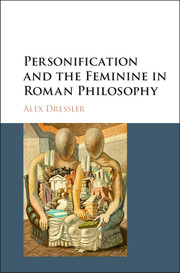22 results
SEBASTIAN MATZNER and STEPHEN HARRISON (EDS), COMPLEX INFERIORITIES: THE POETICS OF THE WEAKER VOICE IN LATIN LITERATURE. Oxford: Oxford University Press, 2019. Pp. xiv + 320. ISBN 9780198814061. £70.00.
-
- Journal:
- The Journal of Roman Studies / Volume 112 / November 2022
- Published online by Cambridge University Press:
- 25 October 2022, pp. 268-270
- Print publication:
- November 2022
-
- Article
- Export citation
SENECA'S AGAMEMNON - (A.J.) Boyle Seneca: Agamemnon. Edited with Introduction, Translation and Commentary. Pp. cxlvi + 600. Oxford: Oxford University Press, 2019. Cased, £120, US$155. ISBN: 978-0-19-881082-7.
-
- Journal:
- The Classical Review / Volume 71 / Issue 2 / October 2021
- Published online by Cambridge University Press:
- 23 July 2021, pp. 414-416
- Print publication:
- October 2021
-
- Article
- Export citation
Index locorum
-
- Book:
- Personification and the Feminine in Roman Philosophy
- Published online:
- 05 August 2016
- Print publication:
- 03 August 2016, pp 304-312
-
- Chapter
- Export citation
Glossary
-
- Book:
- Personification and the Feminine in Roman Philosophy
- Published online:
- 05 August 2016
- Print publication:
- 03 August 2016, pp xii-xiv
-
- Chapter
- Export citation
Dedication
-
- Book:
- Personification and the Feminine in Roman Philosophy
- Published online:
- 05 August 2016
- Print publication:
- 03 August 2016, pp v-vi
-
- Chapter
- Export citation
Chapter 2 - The subjects of personification and personhood
-
- Book:
- Personification and the Feminine in Roman Philosophy
- Published online:
- 05 August 2016
- Print publication:
- 03 August 2016, pp 57-95
-
- Chapter
- Export citation
General index
-
- Book:
- Personification and the Feminine in Roman Philosophy
- Published online:
- 05 August 2016
- Print publication:
- 03 August 2016, pp 294-303
-
- Chapter
- Export citation
Chapter 4 - Girl behind the woman: Cicero and Tullia, Lucretius and the life of the body-mind
-
- Book:
- Personification and the Feminine in Roman Philosophy
- Published online:
- 05 August 2016
- Print publication:
- 03 August 2016, pp 129-166
-
- Chapter
-
- You have access
- HTML
- Export citation
Chapter 3 - Mothers, sons, and metaphysics: others’ agency and self-identity in the Roman Stoic notion of a person
-
- Book:
- Personification and the Feminine in Roman Philosophy
- Published online:
- 05 August 2016
- Print publication:
- 03 August 2016, pp 96-128
-
- Chapter
- Export citation
Bibliography
-
- Book:
- Personification and the Feminine in Roman Philosophy
- Published online:
- 05 August 2016
- Print publication:
- 03 August 2016, pp 256-293
-
- Chapter
- Export citation
Chapter 5 - Embodied persons and bodies personified: the phenomenology of perspectives in Seneca, Ep. 121
-
- Book:
- Personification and the Feminine in Roman Philosophy
- Published online:
- 05 August 2016
- Print publication:
- 03 August 2016, pp 167-204
-
- Chapter
- Export citation
Introduction
-
- Book:
- Personification and the Feminine in Roman Philosophy
- Published online:
- 05 August 2016
- Print publication:
- 03 August 2016, pp 1-28
-
- Chapter
- Export citation
Copyright page
-
- Book:
- Personification and the Feminine in Roman Philosophy
- Published online:
- 05 August 2016
- Print publication:
- 03 August 2016, pp iv-iv
-
- Chapter
- Export citation
Acknowledgements
-
- Book:
- Personification and the Feminine in Roman Philosophy
- Published online:
- 05 August 2016
- Print publication:
- 03 August 2016, pp ix-xi
-
- Chapter
- Export citation
Conclusion: repairing the text
-
- Book:
- Personification and the Feminine in Roman Philosophy
- Published online:
- 05 August 2016
- Print publication:
- 03 August 2016, pp 249-255
-
- Chapter
- Export citation
Chapter 6 - Nature’s property in On Duties 1: the feminine communism of Cicero’s radical aesthetics
-
- Book:
- Personification and the Feminine in Roman Philosophy
- Published online:
- 05 August 2016
- Print publication:
- 03 August 2016, pp 205-248
-
- Chapter
- Export citation

Personification and the Feminine in Roman Philosophy
-
- Published online:
- 05 August 2016
- Print publication:
- 03 August 2016
Chapter 1 - Love, literature, and philosophy
-
- Book:
- Personification and the Feminine in Roman Philosophy
- Published online:
- 05 August 2016
- Print publication:
- 03 August 2016, pp 29-56
-
- Chapter
- Export citation
Contents
-
- Book:
- Personification and the Feminine in Roman Philosophy
- Published online:
- 05 August 2016
- Print publication:
- 03 August 2016, pp vii-viii
-
- Chapter
- Export citation
SENECAN RENDERINGS - P.J. Anderson (trans.) Seneca: Selected Dialogues and Consolations. Pp. xxxii + 219. Indianapolis and Cambridge: Hackett Publishing Company, Inc, 2015. Paper, US$14 (Cased, US$39.95). ISBN: 978-1-62466-368-0 (978-1-62466-369-7 hbk).
-
- Journal:
- The Classical Review / Volume 66 / Issue 2 / October 2016
- Published online by Cambridge University Press:
- 20 July 2016, pp. 437-439
- Print publication:
- October 2016
-
- Article
- Export citation



